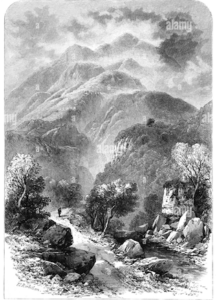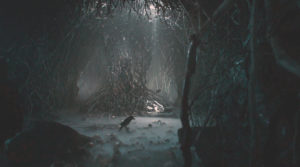Or:
Why this site receives hardly any comments from racialists
Why the silence among the commenters that Benjamin recently complained about?
Looking through the books I read years ago, I see things I already knew but didn’t dare to write about in this public forum out of respect for Hitler and his people. It all has to do with the metaphor I chose for the featured post, ‘The Wall’.
Despite being separated by a Wall, the white nationalists of this century and the National Socialists of the past are very close to each other. The Wall represents either accepting the necessity of genocide/extermination of the racial enemy—pre- and post-Christian ethics (north of the Wall)—or refusing to accept it (Christian ethics, south of the Wall).
If I were merely on the north side of the Wall but close to it, I could get along perfectly with, say, those who comment on Alex Linder’s forum or some of today’s few neonazi exterminationists.
But this is not the case…
I am so far north of the Wall that not even an eagle flying high above the Wall could spot me from its field of vision. I mean that both the National Socialists of the last century, and the white nationalists of the present, regard Jewish subversion as the primary cause of Aryan decline. And I don’t.
I have been very critical of the American racial right for its ‘monocausalism’ but, as I said, I hadn’t dared to confess why I was so separated, geographically, from the classical National Socialists. Perhaps one might get a quick idea of what I mean if we see that Hitler was closer to the Christian Wagner than to the anti-Christian Nietzsche, and I am closer to Nietzsche than to Wagner.
Like Nietzsche, I believe that Christianity and its bastard son (atheistic liberalism) is the primary cause of Aryan decline, not our racial enemies, the Jews. It is precisely Christian ethics, and this already breaks even with Nietzsche’s philo-Semitic stance, that prevents the Aryan from settling accounts with his historical enemies.
From this angle I wouldn’t be a Nietzschean, but a sort of neo-Nietzschean Hitlerite. But neither did Hitler and his ilk know that Christianity was the primary cause of Aryan decline. Most Nazis were monocausalists. Few were type A bicausalists. I, on the other hand, am a type B bicausalist (see this post from a dozen years ago).
Let’s give a few examples, but first let’s be clear that some of the top Hitlerites were aware of the Christian Question. Himmler for example said:
I have the conviction that the Roman emperors, who exterminated [ausrotteten] the first Christians, did precisely what we are doing with the communists. These Christians were at the time the vilest scum… [1]
But unlike me, Himmler was an A bicausalist:
The war we are waging is chiefly and essentially a race war. It is first and foremost a war against the Jew… [2]
And the same could be said of Hitler himself:
[The Jews were] the enzyme of decomposition (Ferment der Dekomposition).
And this, even though in Mein Kampf Hitler claimed that the North Americans held power on the continent, and not the Latin Americans, because the former hadn’t corrupted their blood by marrying Indian women. But in that passage of Mein Kampf Hitler omitted to blame Christian ethics for miscegenation in Latin America, since the Spaniards and Portuguese had admitted mixed marriages since the 16th century. As I have said elsewhere, Hitler couldn’t blame Christian ethics because it would have been political suicide in a Catholic/Protestant Germany. He also said, to his adjutants three days after the Wannsee Conference:
It is the Jew who prevents everything.
I am convinced that the internalised Christian ethics, as a result of an ogre of the super-ego in the Aryan collective unconscious (see my previous post), is what prevents everything. But as I just said, for political reasons Hitler could not speak openly as a bicausalist B, even though there are more critical phrases in Hitler’s Table Talk of Christianity than of Judaism.
The point is: since I am not a politician of my time, like Hitler, but a ‘man against my time’, in solitude I can afford to analyse the Aryan psyche to its ultimate consequences, to the extent that I go further and farther north where only very few will dare to follow me.
That is why this site receives hardly any comments from racialists. Although most are on the south side of the Wall, and only a few have crossed it, no one wants to migrate farther and farther north until they find the raven’s cave.

Even in racism it is much easier not to break with the accepted wisdom than to follow the raven’s lead.
______________
[1] P. Padfield, Himmler (NY: Henry Holt, 1990), page 334.
[2] He said this on 21 June 1944 to top military and SS leaders in Sonthofen.








